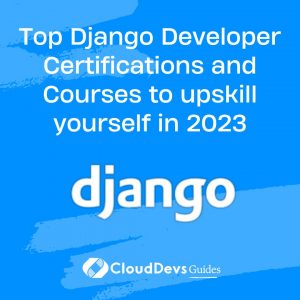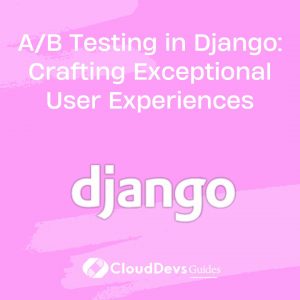Top Django Developer Certifications and Courses to upskill yourself in 2023
Table of Contents
1.0 Python Django – The Practical Guide by Udemy
In this comprehensive course, you will learn everything you need to know about Python Django, from the basics of installation to more advanced topics such as asynchronous programming and unit testing.
- Views and Templates: Django views and templates are at the core of the Django framework. In this section, you will gain a deep understanding of how views work and how to use templates to create dynamic web pages. You will also learn how to create reusable templates and handle template inheritance.
- URL Routing: URL routing in Django allows you to define how URLs map to your views and templates. In this section, you will learn about Django’s built-in URL routing system, how to customize URL routing, and create your own custom URL routes that allow you to control how users access your content.
- Forms: Django forms provide a robust and convenient way to handle user input in your applications. In this section, you will learn about Django forms, how to validate form data, and how to integrate forms with views and templates.
- Authentication: Authentication is a critical aspect of any web application. In this section, you will understand Django’s built-in authentication system, including user registration, login, and password reset. You will also learn how to implement permissions and restrict access to certain parts of your application.
- Database Access: Database access is a fundamental aspect of any web application. In this section, you will understand how to use Django’s database abstraction layer to interact with various databases, including SQLite, PostgreSQL, and MySQL. You will also learn how to manage database migrations and keep your database in sync with your application code.
- REST APIs: Django REST APIs provide a powerful way to expose your application’s functionality as a set of RESTful endpoints. In this section, you will learn about the basic concepts behind Django REST APIs, how to create them, and how to consume them using tools such as the Django REST Framework.
Including 23 hours of on-demand video, by completing this course, you will have a solid foundation in the basics of Python Django and be ready to build robust and scalable web applications. You will also have gained an understanding of advanced topics that will help you take your development skills to the next level.
2.0 Django Essential Training by LinkedIn
Django Essential Training is a comprehensive online course offered by LinkedIn that focuses on teaching you the fundamentals of Django, a high-level Python web framework. This course is designed to provide a solid foundation for aspiring web developers and programmers who want to build robust and scalable web applications using Django.
- Basics of Django: You will start by learning the core concepts of Django, including its architecture, models, views, and templates. They will gain a solid understanding of how Django handles URL routing, forms, databases, and authentication.
- Practical Django skills: You will learn how to create and manage Django projects, handle static and media files, and implement various Django features such as user registration, login, and logout.
3.Build database-driven web applications: You will learn how to integrate Django with databases, explore Django’s Object-Relational Mapping (ORM) and understand how to perform database migrations and query data using Django’s powerful querysets.
- Implement advanced Django concepts: As the course progresses, you will delve into advanced Django topics such as handling user permissions, implementing search functionality, and creating APIs using Django Rest Framework.
- Best practices and coding standards: You will learn how to write clean and maintainable code, adhere to the Django coding style, and implement testing and debugging techniques to ensure the quality of their applications.
By the end of this course, you will have gained a solid understanding of Django and will be equipped with the necessary skills to develop dynamic and scalable web applications using this powerful Python framework.
3.0 Build a Backend REST API with Python & Django (Advanced) by Udemy
In this advanced-level course, you will learn how to build a robust and secure backend REST API using Python and Django REST Framework. This course will cover various modules and content that will equip you with the necessary skills to create a fully functional REST API.
- Core concepts: In this section, you will learn about the core concepts of REST API architecture and its design principles. We will delve into the key concepts such as resources, representations, and hypermedia. You will gain a clear understanding of how RESTful APIs work and how they are designed.
- Working with Models: This module will focus on working with models in Django REST Framework. You will learn how to create custom model fields, handle model validation, and handle relationships between models.
- Views: This module will cover how to write views, use serializers, and handle request and response objects. By implementing views properly, you can create API endpoints that fulfill your application’s requirements.
- REST API endpoints: This module will cover how to create REST API endpoints using Django REST Framework. You will learn how to define routes, use path parameters, and handle HTTP verbs.
- REST API authentication: This module will provide you with an overview of REST API authentication mechanisms. You will learn how to secure REST API endpoints using authentication and authorization.
Including 23 hours of on-demand video, by the end of the course, you will have gained a deep understanding of how to build a robust and secure backend REST API using Python and Django REST Framework. You will be able to create APIs that offer flexibility and scalability.
4.0 Django: Getting Started by PluralSight
In this online course, you will be provided a comprehensive overview of the Django framework and its various components. The course will cover topics such as setting up the necessary environment, creating Django projects, creating models, working with templates, understanding sessions, and handling user authentication.
- Fundamentals of Django: In this section, you will learn about the different components of a Django model, such as fields, relationships, and validations. You will also learn how to create and populate a Django model, as well as manipulate and fetch data from the model.
- Views: These are the backbone of a Django application and are responsible for handling user requests. In this module, you will learn how to create views using Django’s syntax and render templates. You will also explore the different ways to use context in templates to render dynamic data.
- Sessions: These are used to store temporary data across page views in a web application. This module will teach you how to create sessions in Django, store and retrieve session data, and invalidate sessions when necessary.
User authentication: User authentication is a vital aspect of any web application, as it ensures security and allows only authorized users to access certain resources. This module will teach you how to create user authentication with Django, handle user login and logout, and enforce user permissions.
Including 2.5 hours of on-demand video, by the end of the course, you will have a solid understanding of the Django framework and its various components, including models, views, templates, sessions, and user authentication. You will be able to create powerful web applications with Django and leverage its many features to enhance the development process.
5.0 Django Masterclass: Build 9 Real World Django Projects by Udemy
The course covers various modules and topics that will teach you the fundamentals of Django and guide you through building fully functional applications. By the end of the course, you will have hands-on experience in developing real-world Django projects.
- Introduction to Django: In this module, you will get an introduction to Django and learn about the features of Django that make it a popular choice among developers. You will also learn how to install Django and set up a virtual development environment required for building applications.
- Building the Blog App: This module focuses on building a blog application using Django. You will design the app, create the necessary models and views, and write the templates. By following along with the step-by-step tutorials, you will gain practical experience in building a blog application from scratch.
- Creating User Authentication: In this module, you will learn how to implement user authentication in your application. You will implement user registration and login functionality, as well as handle user authentication and authorization. This module will teach you how to secure your application and protect user data.
- CRUD operations: In this module, you will learn about CRUD operations, which stands for create, read, update, and delete. You will implement these operations and also various validations to ensure data integrity and create user-friendly forms.
- Pagination: Pagination is a vital feature for any web application with large amounts of data. This module will teach you how to implement pagination effectively in Django. You will also learn how to implement infinite scrolling, a popular scrolling technique that allows users to continuously scroll through content.
- Deployment: In the final module, you will learn how to deploy your Django application to a live server. You will configure the settings for the production environment, deploy the application to a remote server, and monitor and maintain the application.
Involving 34 hours of on-demand video, by completing this Django Masterclass, you will gain practical skills and a solid foundation in Django development. You will be able to build fully functional web applications and deploy them to production with confidence.
6.0 Django for Everybody Specialization by Coursera
In this specialization, you will learn the fundamentals of Django, including how to install it, use the Django ORM, create and manage a blog application, implement user authentication and authorization, and restrict access to different parts of the application. By the end of the specialization, you will have gained a solid foundation in Django and the skills necessary to build robust web applications.
- Introduction to Django: This section provides a comprehensive introduction to Django, covering its architecture, core concepts, and fundamental features. You will gain an understanding of the advantages of using Django and how it simplifies web application development.
- Creating a Blog with Django: You will learn how to set up the blog project, create models to represent the blog data, and implement the functionality to display the blog home page and the blog archive page.
- User Authentication: You will learn how to set up user models, handle user registration, and implement authentication using username and password. You will also learn how to add social login authentication using OAuth2.
- User Authorization: This module delves into the topic of user authorization in Django. You will learn about the concept of roles and permissions, and implement them in your Django application. You will learn how to restrict user access to different parts of the app based on their roles and permissions.
Completing the Django for Everybody Specialization will provide you with a solid foundation in Django and the necessary skills to build robust web applications. Whether you are a beginner or an experienced developer looking to enhance their Django skills, this specialization offers a comprehensive introduction to Django’s core concepts and features.
| Course/ program | Cost | Level | Duration | Study mode |
|---|---|---|---|---|
| Python Django - The Practical Guide by Udemy | $74.99 | Beginner | 23 hours | Online |
| Django Essential Training | $0 | Beginner | 2 hours | Online |
| Build a Backend REST API with Python & Django (Advanced) by Udemy | $74.99 | Intermediate/ Advanced | 23 hours | Online |
| Dganjo: Getting Started | $0 (involves PluralSight subscription) | Beginner | 2.5 hours | Online |
| Django Masterclass : Build 9 Real World Django Projects | $74.99 | Intermediate/ Advanced | 34 hours | Online |
| Django for Everybody Specialization by Coursera | $0 | Beginner | 2 months | Online |
As summarized in the table above, the cost, level and duration of each course differs from the next. Moreover, certain courses tend to be more costly, whereas some are specifically more appropriate for advanced and intermediate level developers. In your own choice of skills to pursue, goals and budget should be considered.
7.0 Conclusion
If you are a developer looking to enhance your skill set and staying updated on the latest best practices and trends, the programs mentioned here provide valuable opportunities of getting much needed knowledge and practical experience to excel in the professional context. Even if you are an intermediate developer or a beginner, investments made in these resources improves your proficiency in development in 2023.
Table of Contents






